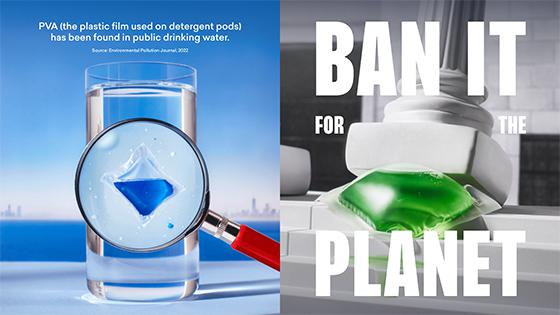”

Blueland wants to save the planet — and that mission begins with marketing laundry tablets, reusable products and bottles not wrapped in plastic, which damages wildlife and our water
supply.
The company, co-founded by CEO Sarah Paiji Yoo, wants to make it easy to be eco. And that push is represented in its "Pods are Plastic" campaign. The out-of-home effort,
created by Blueland's internal team, educates New York City consumers about the dangers of micro and nanoplatics contaminating our water supplies, due to detergent pods and sheets.
To keep the
dangers visible, Blueland has taken to the streets. Wild postings in 20 locations across downtown Manhattan and Brooklyn (Williamsburg, East Village, Union Square, SoHo, West Village, Flatiron,
Greenwich Village) will run through March 15.
advertisement
advertisement
The posters highlight how PVA + microplastic from detergent and dishwasher pods can be found in breast milk, drinking water, ocean water, rivers
and soil. PVA is not biodegradable.
Yoo founded her company as a new mother who wanted to use less single-use plastic.
“We've been vocal about the dangers of PVA for the past
three years and are excited to see these concerns are being heard. We hope this campaign sends a powerful message to all businesses that products and profit should not come at the expense of the
environment and safety. The Pods Are Plastic Bill and the campaign serve as a bold step toward a cleaner, plastic-free future for our city and
beyond,” Yoo told Agency Daily.
The campaign supports the Pods are Plastic Bill, introduced by City Council Member James Gennaro (D) on Feb. 8. The bill would make selling or
distributing detergent pods or laundry sheets with polyvinyl alcohol (PVA) in NYC illegal. If passed, it will be the first bill of its kind in the U.S., taking effect Jan. 1, 2026.
Taking
plastic pods and sheets off the market won't make it more expensive for consumers, as there are alternatives, including liquid powder and tablet detergents. The concern is that the city's 14
wastewater treatment plants don't have the capabilities to fully treat plastic film found in pods and sheets.
“PVAs are the most concerning of emerging contaminants,” Gennaro
told the
New York Post. “It’s important for people to know I’m being very cautious, and we’re taking a science-based approach.”